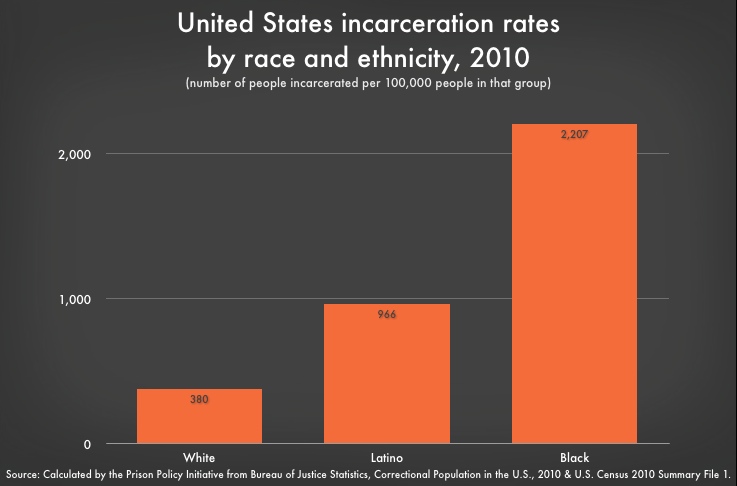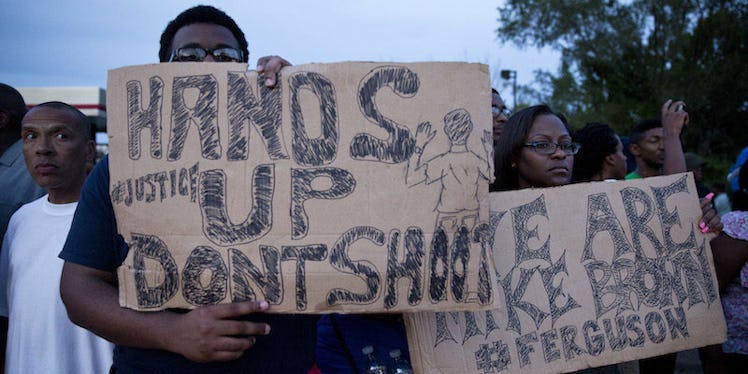On Monday, a St. Louis County grand jury decided not to indict Officer Darren Wilson for fatally shooting Michael Brown.
Due to inconsistent eyewitness reports, conflicting physical evidence, as well as varying results in several autopsies, the grand jury decided that there was not enough to justify bringing charges against Wilson. The charges could have ranged from negligent manslaughter to intentional murder.
It's important to note that the state attorney general could still bring charges against Wilson. Likewise, the Justice Department is still investigating whether or not to charge him with violating Brown's civil rights.
Thus, Wilson could still go to trial, but the history of this country leads one to believe that this is highly unlikely.
For now, the grand jury's decision is understandably disappointing to many people. The announcement on Monday night in Ferguson sparked both peaceful protests and riots in the community.
Unfortunately, Ferguson saw a fair amount of violence and destruction over the course of the night almost immediately after the decision was made public. Police cars were destroyed and lit on fire, buildings were set ablaze, gunshots were fired, and businesses were destroyed and looted.
This does not mean that the entire community of Ferguson contributed to the pandemonium; many were peacefully demonstrating against what has been viewed as an unjust decision.
There were also peaceful protests in major cities across the United States, including New York City, Washington DC, Oakland, Seattle, Philadelphia, Los Angeles and Chicago. These continued into Tuesday night as well.
In the words of Dr. Martin Luther King Jr.:
Violence begets violence.
Simply put, while we shouldn't condone the actions of those who contributed to the chaos on Monday night, we can't forget that none of this would have happened if we did not live in an inherently violent and unequal country.
Ferguson is proof that our system is broken. At the same time, it's a sign that we should've fixed it a long time ago.
Ferguson Reminds Us That Police Brutality And Racism Are Alive And Well In 2014
On August 9, Officer Wilson, who is white, shot and killed Brown, an unarmed 18-year-old African-American. According to some witnesses, Brown was attempting to surrender and put his hands up in the air when he was shot.
This sparked outrage both within the local community and around the nation, leading to mass protests and violent clashes with the police.
Despite the fact that the majority of protestors voiced their concerns peacefully, police responded to their actions with brute force. Police utilized military-grade equipment, including rubber bullets and tear gas, against peaceful protestors and journalists alike. At times, they also unjustifiably arrested both protestors and members of the media.
The excessive and often brutal police response garnered international attention and widespread criticism.
Correspondingly, the events in Ferguson reignited the painful debate surrounding racism and police brutality in the United States.
While this country has made great strides in regards to race, it's apparent that we still have a long way to go in terms of fostering a more equal and accepting society.
It's important to remember that there are a lot of honest, hard-working members of law enforcement who genuinely want to serve and protect. Yet, we can no longer deny that the system is inconsistent and unfair, and that it was this way long before Michael Brown was fatally shot and killed.
Indeed, we live in a country where police are safer than other members of society. The laws favor them, instead of common citizens.
Police Killed Over 400 People Last Year... Whom We Know About
Violent crime in the United States is going down. Homicide, robbery, rape and aggravated assault decreased by 48 percent in the United States between the years of 1993 and 2012.
Since 1993 alone, the gun homicide rate in the United States has dropped by 49 percent.
Even Chicago, which is often characterized as a war-zone, has seen drastic reductions in crime rates over the past three years.
In essence, Americans are becoming less violent and decreasingly criminalistic.
Concurrently, police fatally shot 461 felony suspects last year, the most in two decades.
Comparatively, 27 police officers were slain in the line of duty in 2013, the fewest in more than 50 years.
Likewise, as Nick Wing highlights for Huffington Post:
While reports by the FBI and other groups give a good idea of how many officers are killed in the line of duty each year, the number of people killed by officers is far less certain. The unrest in Ferguson reminded the nation that there is no federal database or reporting standard to track of the number of justifiable homicides -- or even total people killed -- by police each year.
In other words, Americans are less violent, law enforcement is safer and yet hundreds of Americans, maybe more, are being killed by police officers every year.
The statistics seem to show that American police are far too trigger happy.
Police Who Kill Civilians Hardly Ever Go To Jail
As we learned last night with Officer Darren Wilson, it is extremely rare for police officers to be indicted, or formally charged with a crime.
This is because police who kill people in the line of duty are protected by the law.
The law states that police can commit what is known as a "justifiable homicide," under two circumstances. One is "to protect their life or the life of another innocent party," and the other is to prevent a suspected violent felon from escaping.
Thus, if police officers kill someone in the line of duty and claim that they believed their lives were being threatened, then the shooting will likely be viewed as justifiable.
Simply put, the law gives police officers the benefit of the doubt. After all, the person whom they shot and killed can't be there to protest or defend.
If evidence or eyewitness accounts aren't compelling enough to suggest otherwise, then police will likely get away without being charged with a crime.
This is not to say that every time a police fatally shoots someone that it isn't justified. Yet, as Alex S. Vitale notes for Al Jazeera:
There are major legal, institutional and social impediments to prosecuting police. For example, Coleman Brackney, a Bella Vista, Oklahoma, police officer who was convicted of misdemeanor negligent homicide in 2010 after shooting an unarmed teen to death while in custody in his cruiser, went on to rejoin the police and was recently appointed chief of police in Sulphur Springs, Oklahoma.
At the same time, if you're not a police officer, you're far more likely to be indicted. In almost every instance, a grand jury will decide to indict.
To put this into perspective, US attorneys prosecuted 162,000 federal cases in 2010 alone. Out of all those hundreds of thousands of cases, grand juries only declined to return an indictment 11 times.
Obviously, there is something very wrong with the system of laws in this country. The very people who are meant to uphold our laws are rarely held accountable.
Indict America... The Criminal Justice System Is Broken
In a system that favors police, it's no coincidence that the United States has the largest prison population in the world.
It's also disproportionately black.

If we look at marijuana arrests alone, the racial disparity is staggering. Blacks and whites consume marijuana at the same rate, but blacks are nearly four times more likely to be arrested for possession.
It's apparent that our criminal justice system is deeply flawed, fundamentally discriminatory and completely out of control.
Furthermore, the killing of Michael Brown was not an isolated incident, police brutality is a national problem.
This past weekend, cops shot and killed a 12-year-old African-American boy in Cleveland who was carrying a fake pistol. His name was Tamir Rice; he was just a kid with a toy.
This is the country we live in, and it's up to us to take a stand against these injustices.
